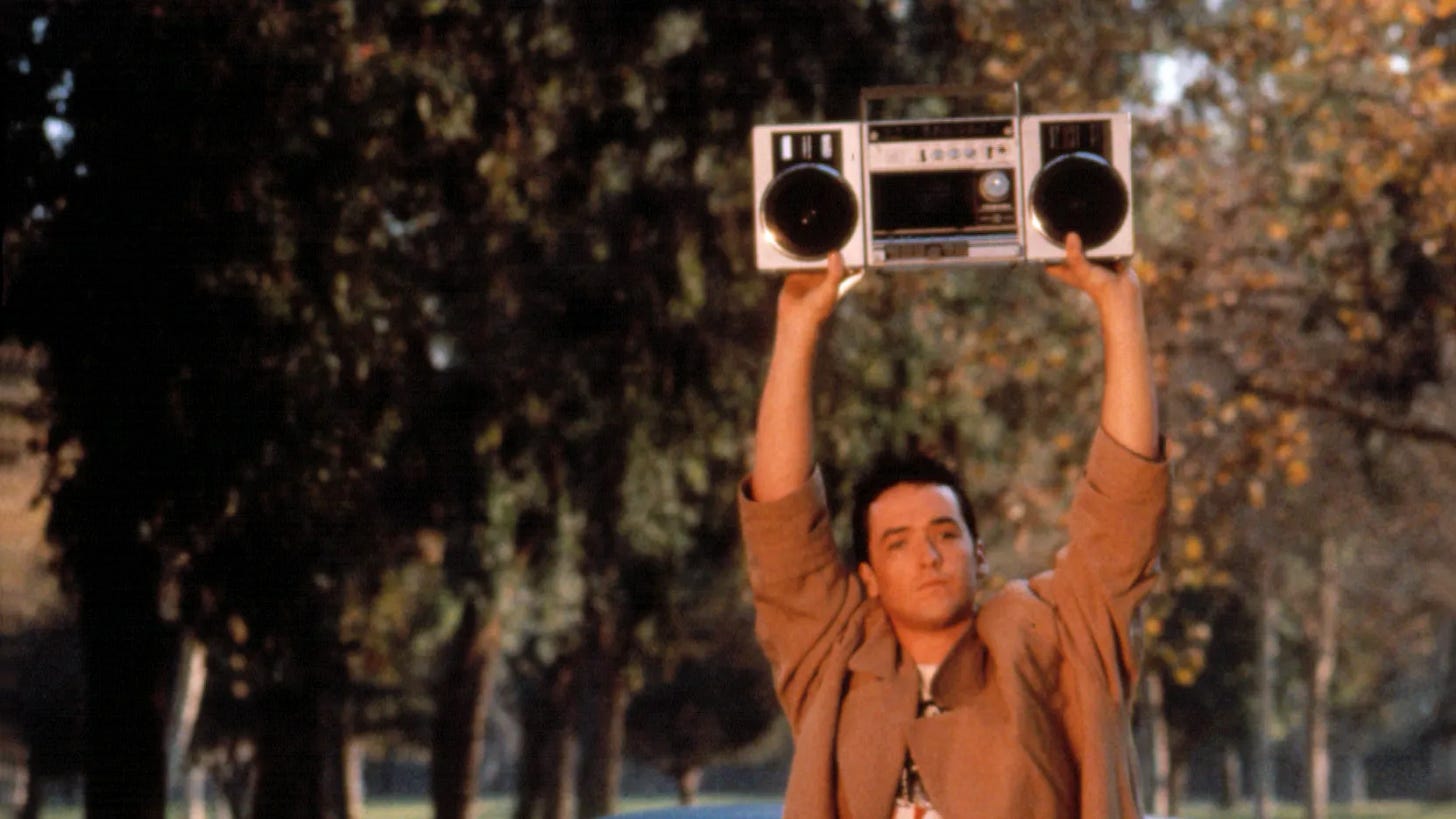are you still yearning?
the troubles with yearning and the difference between desire and value
In the beginning, initials were drawn in the corners of notebooks and the crevices of margins; now, boomboxes in the rain and sweet whims are whispered in the absence of concrete words. Then and now, we have yearned for something beyond our reach. And like your confidant working up the courage to present the reality of a crush, I, too, dare to break our ties to truly futile romanticism. In both these examples, we see desire, the manifestation of which is often neither close nor on its way. So what happens when our idea of the chase, the drive, and the yearning is shaped by perception rather than reality, leading us down the road with ghosts and dreams?
Through a succession of rom-coms, devotions to love and lust poured into novels and lyrics, yearning has become central to human relationships. It is often positioned as the prerequisite to a fruitful companionship, the work that must be done to deserve any eventual companion. In this idealised version of longing, waiting is no longer passing time nor absence defined by separation. Time apart is the dedication of thoughts and dreams to one another; the distance is only a marker of the journey back to each other. Yearning takes root in those liminal spaces and thrives in isolation because, for the most part, yearning is a solitary endeavour, making it all the more intoxicating and often deceitful.
But from what we have seen, the yearner almost always wins: grand gestures are rewarded with all-encompassing hugs and ravenous kisses as if the intensity of the yearning justifies the resolution. A yearner’s greatest achievement is to evoke the same flurry of emotions in the person they desire. This matched, if not greater, intensity of feelings can only be resolved in a surrender to love, thus attempting to prove that yearning and fulfilment go hand in hand.
In these portrayals of devotion, the camera tends to focus on the yearner, panning to the love interest only when they are confronted with a confession or proposal. (Most times, it is the man yearning for the woman.) Once again, the pursuit of another is prioritised and romanticised, diminishing at times the reality of the “object” of this pursuit. I often think about how shocking it must be to discover such things in reality. By focusing on one narrative, we essentially strip the other person of their own desires. Oftentimes, when there has been little to no indication that this is how someone feels, as tends to be the case with popular depictions of romance (think friends-to-lovers or enemies-to-lovers), it would not be a reach to imagine a sense of pressure, if not discomfort, upon revelation.
I can only imagine that in some situations, although it may not be a prominent factor, some people may feel guilt for not sharing equally in the burden of “work” that has been done up until that moment. We see it when others say, “But it is clear he likes you so much. Why wouldn’t you go for a man who so clearly wants you? Has worked for you?”
I argue that very little work has been done at all—meaningful work, that is. Yearning, once distilled and simplified, is a desire in its purest form, and I have always had somewhat difficult feelings about desire, partially influenced by my own experiences and a couple of philosophies (my brief introduction to Sartre and Plato).
When I began to ruminate on this topic many months ago, I was fixated on the following question: can yearning truly ever be about the other person? It was that question that led me to Plato’s Theory of Forms. He argues that the physical world we interact with is not the most accurate version of reality. To him, there exists somewhere a realm in which all perfect forms exist, and that is what everything is based on to varying degrees. I do not think it can be applied to everything, but yearning for someone, desiring someone, seems to be the perfect analogy for this. As I said, yearning is often done in separation from the object of your ideals; you rely on your perception of them, mutated by your wants and sometimes overwhelming desires. Yearning gives you access to that realm of perfection, untouched by reality. The longer we yearn, the more perfect the other person becomes in our minds, with no evidence to say otherwise. It is when you are confronted with the actual person in the physical realm that they start to fall short. No one can live up to an idealised version of themselves, so yearning often outlives its resolution.
If all yearning resulted in an eventual yet anticlimactic resolution, I would be all for it. I tend to have slightly bleaker views on relationships based solely on desire, and in this, Sartre and I agree. I have been known to rant on TikTok about why I do not want someone to desire me; I want them to value me. Reducing motivations to these two camps may be slightly reductive, but you get the gist. When you are desired, you are put on this floating pedestal, constantly rising the longer the infatuation lasts. You do not have to know someone to crave them; it is easy, and it comes as easily as wishing. At its worst, you become a figment, a callous husk of your full potential, and there is no choice. You are appreciated for who you could be instead of who you are.
And then, of course, in moments of self-reflection, I realise that the times I have felt the most longing—constantly wishing, hoping, desiring a certain thing—it was almost always in service of filling something I lacked. A sort of hunger for anything, any mass that would fill the pit. We often turn to love and desire for a feeling of wholeness or meaning, but no one person can truly ever satiate that need.
Desire is inherently self-serving. Sartre argues that we seek out others not for what they are but for what they can awaken in us. This could be a sense of purpose, happiness, fulfilment, or more. He also believes that desire is doomed to dissatisfaction. What happens when that initial trigger or spark fades? What is left? If love is built on desire alone, can it withstand the weight of reality?
Unfortunately for some, we are rarely ever satisfied in this way, which is why I have tried to reprioritise value. When you are valued, you are appreciated for who you are instead of who you could be. Valuing a person is deciding to truly know them with the hope that someday you will understand. There is a sense of devotion that desire lacks and a sense of self-sacrifice. Sartre argues that recognising a person and parsing them with as much subjectivity as you can is difficult. It requires that will, that need to let go of your fantasies and face what is in front of you. Desire must consume, and value wants to see.
You know when you are valued because it shows. You are aware of the process instead of being surprised by the loud and often jarring sound of a boombox at your front door. The majority of yearning and desiring can be done in the shadows. At least value offers you proof of their labour.
We are taught that yearning is the most concrete proof of love and that the intensity of desire translates to the strength of devotion. As you can see, I tend to differ. So, while it may be cinematic and affirming on the surface, I think I will avoid such entanglements for now. Maybe instead, we need something quiet, patient, and real, something that will stay with us even after the final credits roll.
Hey guys, hope you enjoyed this weeks essay! It’s one I meant to send out over a year ago but I only got round to recently. I will be discussing similar topics in a video essay with
so look out for that soon ( when editing is done 😭) .As per usual, you can find me on TikTok, Instagram (daily media recommendations) and Arca (curated recommendations)
Oh and don’t forget the next episode of What My Brain Eats with another special guest is coming soon !! Check out my latest episode with Shaniya 💗💗










this is a very interesting view on a hot topic like yearning. i feel like you have changed my mind about it.
it’s true that yearning is most times rooted in desire and i see your point on how that can easily dissolve in time. but at the same time, i see why the “bring back yearning” trend caught on so quickly. because the opposite of yearning is indifference, apathy. in an era where everything can be so easily acquired in terms of material things, relationships have kinda become simply a void object to collect. yearning represents desire, need, want. whether it’s superficial or short lived, its better than plain old disinterest. like most trends in society, maybe we have to go to the furthest opposite extreme first (yearning) in order to find a good middle ground (genuine value, like you say).
why did I miss this😓😓LOVED THIS